Iran’s Parliament Examines Tehran-Moscow Information Security Bill
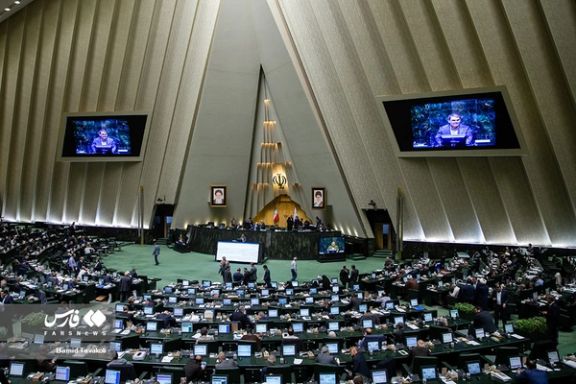
The Iranian parliament is reviewing a bill covering cooperation between Tehran and Moscow on information security, according to IRNA, the Iranian state news agency.

The Iranian parliament is reviewing a bill covering cooperation between Tehran and Moscow on information security, according to IRNA, the Iranian state news agency.
The bill is presented to the parliament in order to implement an agreement signed three years ago by Iran’s former foreign minister Mohammad Javad Zarif and his Russian counterpart, Sergei Lavrov.
The nine-article bill reportedly aims to combat cyber threats, strengthen information security and promote cooperation.
The bill also has a clause that refers to the exchange of information and cooperation in the prosecution of criminal offences between Iran and Russia.
In recent years, Tehran and Moscow have boosted their political, military, communication and cyber relations, raising concerns among Western countries and their allies.
Earlier in November, Microsoft’s Threat Analysis Center (MTAC) reported that Russia, Iran, and China are likely to plan to influence the upcoming elections in the United States and other countries in 2024.
“Election infrastructure, campaigns, and voters” are expected to be targeted by “authoritarian regimes,” Microsoft warned.
The report also confirmed that Iran has intensified its cyberattacks and influence operations since 2020, targeting Israel and Bahrain, for instance.
Back in July, Claudia Plattner, the head of the German Federal Office for Information Security (BSI), warned of a growing threat from Russian, Iranian and Chinese cyber-attacks.
“The goals are espionage, destabilization and influence,” said Plattner, adding that Germany as a European power and supporter of Ukraine is an “attractive target” for hacker groups.
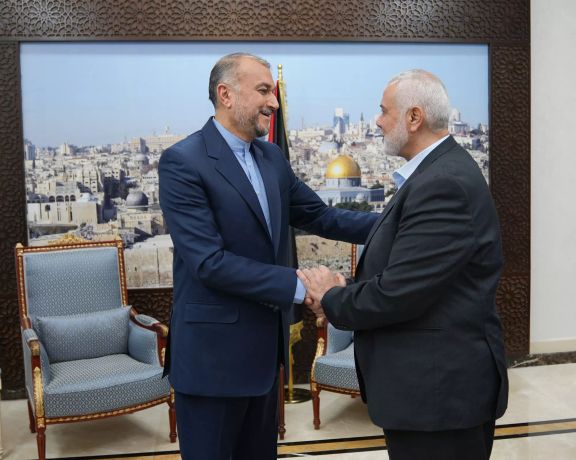
Iran’s Foreign Minister Hossein Amir-Abdollahian says Hamas has so far responded well to the Israeli “aggression” but the coming days will be “extremely frightening” for Israel.
He made the comments during a phone conversation Wednesday evening with his Qatari counterpart, Sheikh Mohammed Bin Abdulrahman Al Thani to discuss the ongoing war in Gaza, Fars news agency affiliated with the IRGC reported.
Amir-Abdollahian, repeating Tehran’s rhetoric, once again accused Israel of violating international laws and carrying out war crimes and genocide in Gaza, the report added.
Despite the allegations made by Tehran officials, the Israeli army, over the past days, has issued warnings and evacuation plans for Palestinians who live in the southern Gaza Strip to minimize civilian casualties in the area.
In a post on X on Wednesday, Amir-Abdollahian also called on Egypt “to open the Rafah border unconditionally for the delivery of medicine, food and fuel throughout Gaza.”
Israel has recently pledged to facilitate the entry of humanitarian aid to the Gaza Strip. Israel regularly screens aid trucks and shipments sent to Gaza to avoid the smuggling of arms and military devices to the region.
Iran, the primary supporter of Hamas, has provided military and financial assistance to the militant organization which launched a deadly onslaught on Israel on October 7, killing 1,200 and taking over 240 people hostages. However, so far, Tehran has refrained from direct involvement in the war to defend its ally.
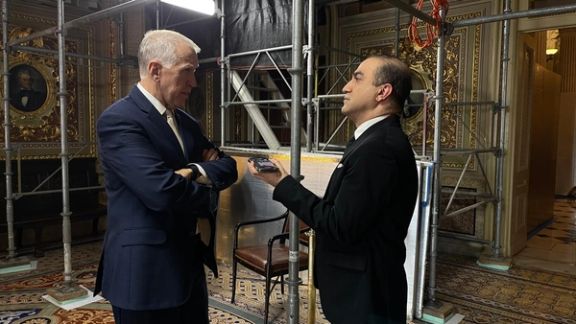
The Biden administration is receiving more and more criticism over its failure to deter Iran and its proxies in the Middle East since the Gaza war broke out in October.
A marked increase in attacks by Iran-backed Houthis has been met by no US retaliation, leaving many lawmakers and officials in Washington confused and dismayed.
“We need to start holding them responsible,” Senator Thom Tillis told Iran International’s Arash Aalaei on Wednesday afternoon. “I think the administration needs to take a firmer stance because we all know that this is aided and abetted by Iran.”
In the past few days, two US destroyers, Carney and Mason, have been forced to engage in military action when they faced missiles and drones launched from territory controlled by Yemeni Houthis.
On Wednesday, the USS Mason intercepted and shot down a drone launched from a Houthi-controlled area. Three days earlier, USS Carney shot down three drones after it received distress calls from vessels that had come under attack from Iran-backed Houthis in the Red Sea.
“Every one of these drones and every one of these missiles that are launched at commercial vehicles are arguably acts of terrorism,” Senator Tillis said.
But the Biden administration seems to be reluctant to act on that basis, stating that it could not be established beyond doubt that the Houthi intended to target American warships.
Senior Biden administration officials are said to be against targeting Houthis for now, according to Politico, even though some military officers are calling for “more forceful responses to the militants’ attacks in the Red Sea.”
President Biden's critics say his lack of action against Iran has enabled and emboldened the regime and its proxies in the region. Many accuse Biden of pursuing a policy of “appeasement” with Tehran.
“The Biden administration has been funneling billions of dollars to the largest sponsor of terror,” Republican Senator Ron Johnson told Iran International’s Arash Alaei Wednesday. “The Biden administration’s weakness has inflamed the world.”
President Biden and his top team have been trying hard to avoid an expansion of the conflict since Hamas forces attacked Israel on 7 October. They seem to be concerned that the regime in Tehran would escalate through its proxies in Yemen, Lebanon, Syria, and Iraq, Politico reported.
More specifically, the US government seems to be concerned that targeting Houthis or even re-designating them as a terror group could jeopardize the Yemen peace process and perhaps the recent thaw between Iran and Saudi Arabia.
Many in Washington see emboldened attacks by Houthis as a direct result of the White House's decision to remove the group from the US terrorism blacklist in the first days of the Biden administration.
“The despicable acts of terrorism in the Red Sea show the recklessness of President Biden’s decision to de-list the Houthis as a foreign terrorist organization when he took office,” said Senator Roger Wicker, ranking member of the Senate Armed Services Committee.
“It is time to deliver a punishing, forceful response to Iran’s proxies throughout the region and re-list the Houthis,” he told the Daily Caller.
Since the beginning of the Israeli onslaught on Gaza, the Houthis have attacked several vessels in the Red Sea and launched drones and missiles towards Israel. But they had avoided direct conflict with the Americans – until last weekend.
This week’s incidents forcing US warships to engage has raised the stakes. Pointing out the failure of the current strategy to deter Iran and its proxies, the Republicans in the Congress are calling on the administration to react with more force.
With no clear end to the conflict in sight, it seems certain that foreign policy, in general, and the relationship with Iran, in particular, would become a hotly contested issue in the next year’s Presidential election.
“You know what WILL send Iran a message of deterrence,” asked Senator Roger Marshall on X, “firing Joe Biden in 11 months.”
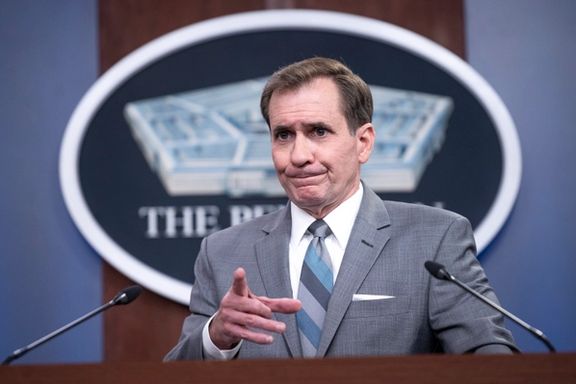
US National Security spokesman John Kirby emphasized on Wednesday that Washington will continue to hold Tehran and Moscow accountable for their growing military ties.
Referring to Iran’s military assistance to Russia and to extremist militant groups in the Middle East, Kirby warned that the burgeoning relationship between Tehran and Moscow “is not only not good for the Ukrainian people but it’s certainly not good for the region.”
If the Iranian regime avails itself of Russian military capabilities, it can become “more lethal and more dangerous to its neighbors,” he added against the backdrop of Iranian President Ebrahim Raisi’s visit to Russia on Thursday.
According to Kirby, the US Department of Treasury has sanctioned nine entities and five individuals who facilitated Moscow’s access to electronics with military applications.
The Department of Commerce has also slapped sanctions against 42 entities around the world for their activities against US interests, especially those engaged in Iran-Russia drone production.
The killings of innocent Ukrainians is partly carried out “through the use of Iranian drones,” Kirby stressed.
Since mid-2022, Iran has reportedly supplied hundreds of kamikaze Unmanned Aerial Vehicles (UAVs) to Russia, which have been extensively used to target civilian infrastructure and cities.
Kirby also pointed to Iran’s backing of its proxy groups in the region, especially Yemen’s Houthis who have time and again attacked US and Israeli interests in the region.
“We know that the Houthis are supported by Iran, not just politically and philosophically but, of course, with weapon systems,” he pointed out.
Though the Islamic Republic has avoided any direct involvement in the Israel-Hamas conflict, the regime has used its allies such as Houthis and Hezbollah to attack Israel and American targets.
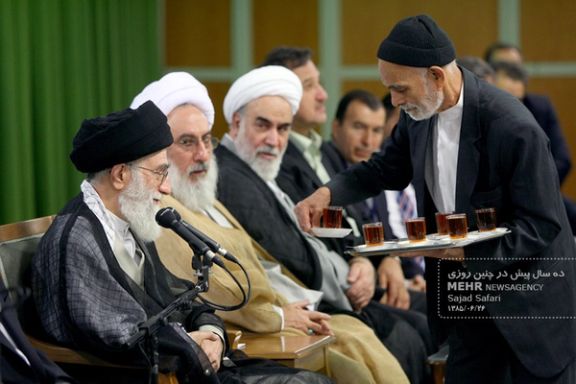
The Iranian government is reluctantly acknowledging one of the most significant cases of financial corruption in Iran, displaying a matter-of-fact attitude.
Several government offices in both the current and previous presidential administrations are alleged to be involved in the nearly $3.5 billion corruption case. These include the ministers of agriculture, industry as well as the governors of the Central Bank of Iran and the chiefs of Iranian Customs Administration.
However, Supreme Leader Ali Khamenei, who has not yet commented on the case, has consistently rejected statements about systematic corruption in Iran. The scandal comes at a time when the government has failed to lower inflation hovering above 50 percent and people face shortages of medicines and powdered baby formula.
Last week, Iran’s Inspection Organization disclosed that a prominent tea importer is under scrutiny for questionable financial practices.
The company, handling most of the country's tea imports, reportedly received a staggering $3.37 billion in foreign currency at discounted government rate for tea and machinery imports from 2019 to 2022. However, it has allegedly sold $1.4 billion of the currency on the free market at a higher rate.
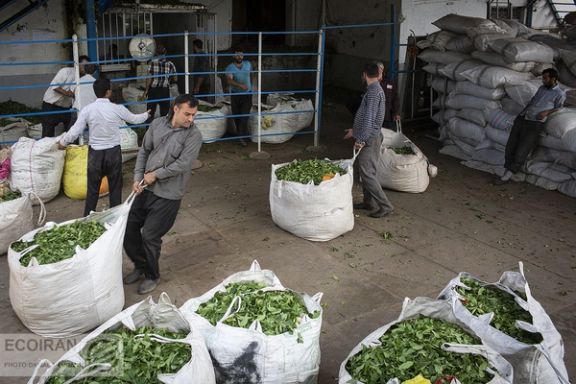
Several Iran watchers and analysts, including Leyli Khameneh, have told Iran International TV that this indicates systematic corruption, with several high-ranking government officials implicated. Media reports have also implicated top officials, including Vice President Mohammad Mokhber. Ms. Khameneh has also noted the apparent reluctance of the Iranian Judiciary to address the case.
Government spokesman Ali Bahadori has referred to the case as an ongoing routine matter, stating that several low and mid-ranking officials have been arrested. However, he questioned why the case became publicized in the media.
The former head of the Iranian parliament's National Security and Foreign Relations Committee Heshmatollah Falahatpisheh has described the case as "One of the biggest embezzlement cases in Iran and accused the Iranian parliament of being silent about it without paying attention to their supervisory role. He found it peculiar that, with conservatives in control of both the government and the Majles (parliament), both entities are silent about a scandal primarily attributed to the current government and its officials.
The Debsh Tea Company received US dollars from the government based on a preferential rate of exchange without checks and balances. However, the case has other dimensions including selling low-grade tea imported from Kenya as high-grade tea originating from India. Meanwhile, the company has been also involved in what has been described as fraud by re-importing cheaper Iranian tea and pocketing the difference in foreign currency.
Falahatpisheh argued that the corruption case exposes the parliament's "big failure" in supervising the activities of the executive branch, emphasizing that the government has never previously ignored the Iranian parliament.
Meanwhile, Habib Jahansaz, the head of the Iranian government's Tea Organization called the corruption case "unprecedented" and said Iran's annual need for import tea is limited to only $300 million. He added that the government’s Tea Organization was not involved in the case in any form whatsoever!
Moderate news website Rouydad24 suggested that the corruption case is the result of a lack of transparency in the government's allocation of low-rate foreign currency to well-connected importers, potentially resulting in significant financial losses for the country.
Iranians on social media, including former Vice President Abdollah Ramezanzadeh have criticized Khamenei and President Ebrahim Raisi without explicitly naming them for denying that there is systematic corruption in the country's executive branch.
Some reports say that until 2020 the annual budget allocated for importing tea was around $300 million, but the budget was suddenly tripled in 2021 without any justification.
Criticizing the government and the parliament for their part in the case, commentator Ali Mojtahedzadeh called on officials to at least accept that there is something wrong about the way the parliament and some government organizations operate.
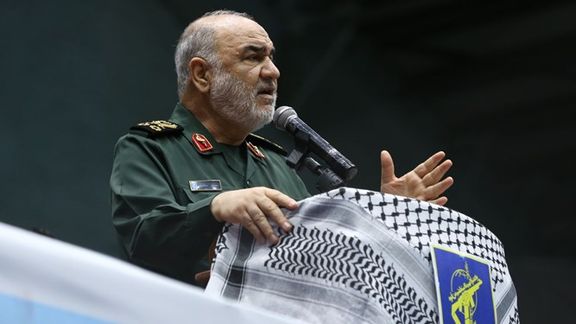
The commander of Iran’s Revolutionary Guard has claimed that Israel is unable to continue its war against Tehran-backed Hamas in the long-term.
Speaking two months after the October 7 massacre of Israelis sparked the conflict with the militant group in Gaza, Hossein Salami said on Wednesday: "The Zionist regime will not be able to handle a long-term war.”
The IRGC commander claimed that the ongoing conflict which has claimed thousands of lives in Gaza “is primarily fueled by [Israeli prime minister Benjamin] Netanyahu's personal motivations”.
Salami also said he believed that only a fraction of the resistance's capabilities against Israel has been activated so far in the conflict.
The comments come as Israel has renewed its commitment to "destroy the Iranian proxy in Gaza" and also deter other Iran-backed groups, including Hezbollah in Lebanon.
Israeli government spokesman Eylon Levy told Iran International on Tuesday that the military offensive aims to combat the perpetrators of the October 7 massacre rather than escalate into a regional conflict.
The conflict erupted following Hamas’s invasion of Israel on October 7, when thousands of militia members took the lives of around 1,200 Israelis and other nationalities, and took hundreds of hostages back to Gaza. Retaliatory attacks in Gaza have claimed over 15,000 lives, with hundreds of thousands displaced. Israel's efforts to uproot Hamas have faced the challenge of the Islamist group’s strategic use both of civilians as human shields and an extensive underground tunnel network spanning around 500 kilometers.
Salami also commented on the deployment of aircraft carriers to the region, in a veiled comment targeted at the United States, stating, "Aircraft carriers are being sent to the region, serving as symbols of the power of an empire navigating the world's waters, acting as tools for penetration and political control. However, when they reach Iran, they lose their political significance and are forced to be influenced."